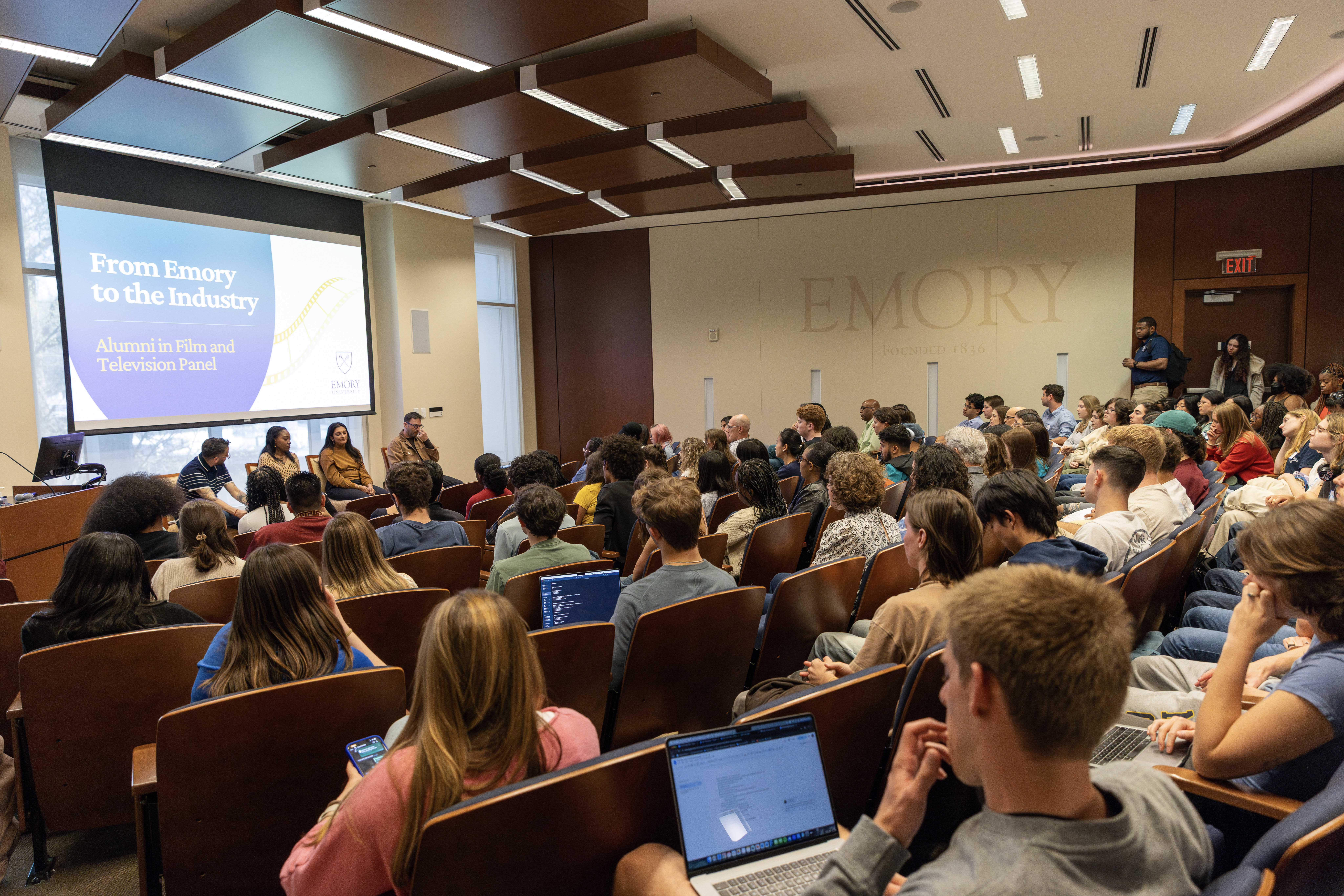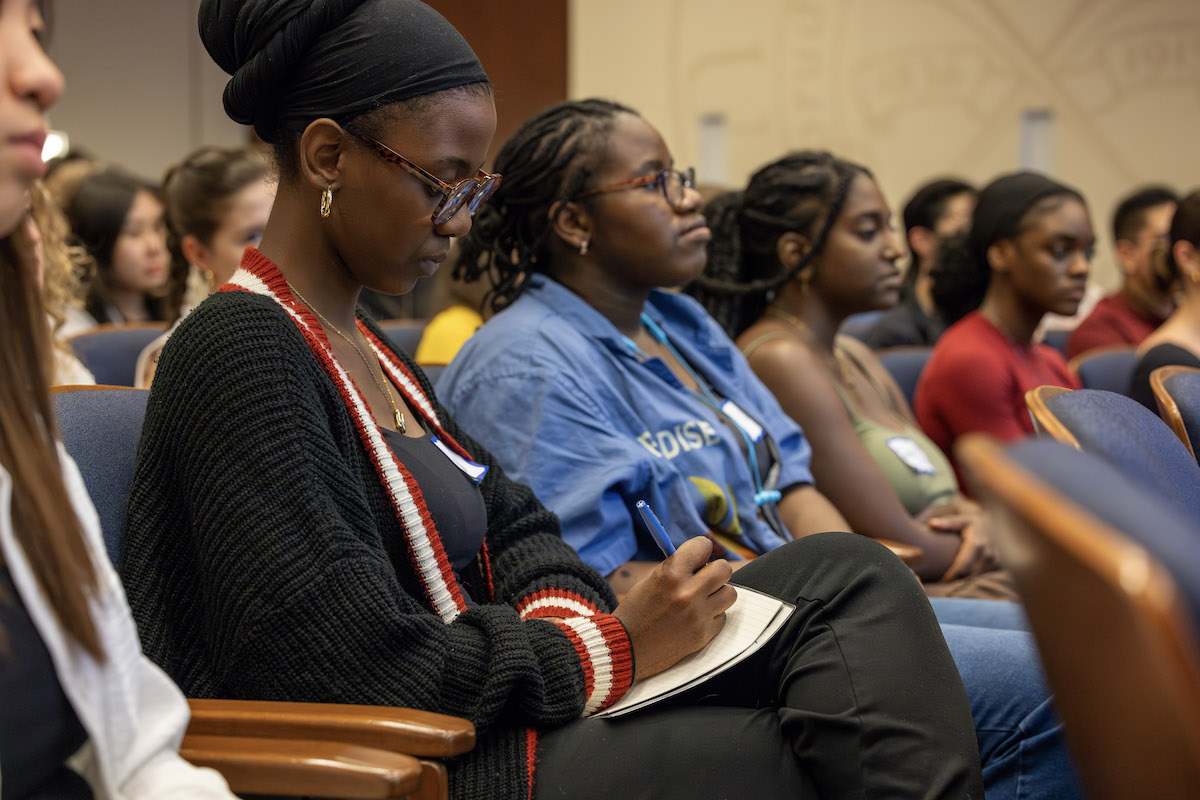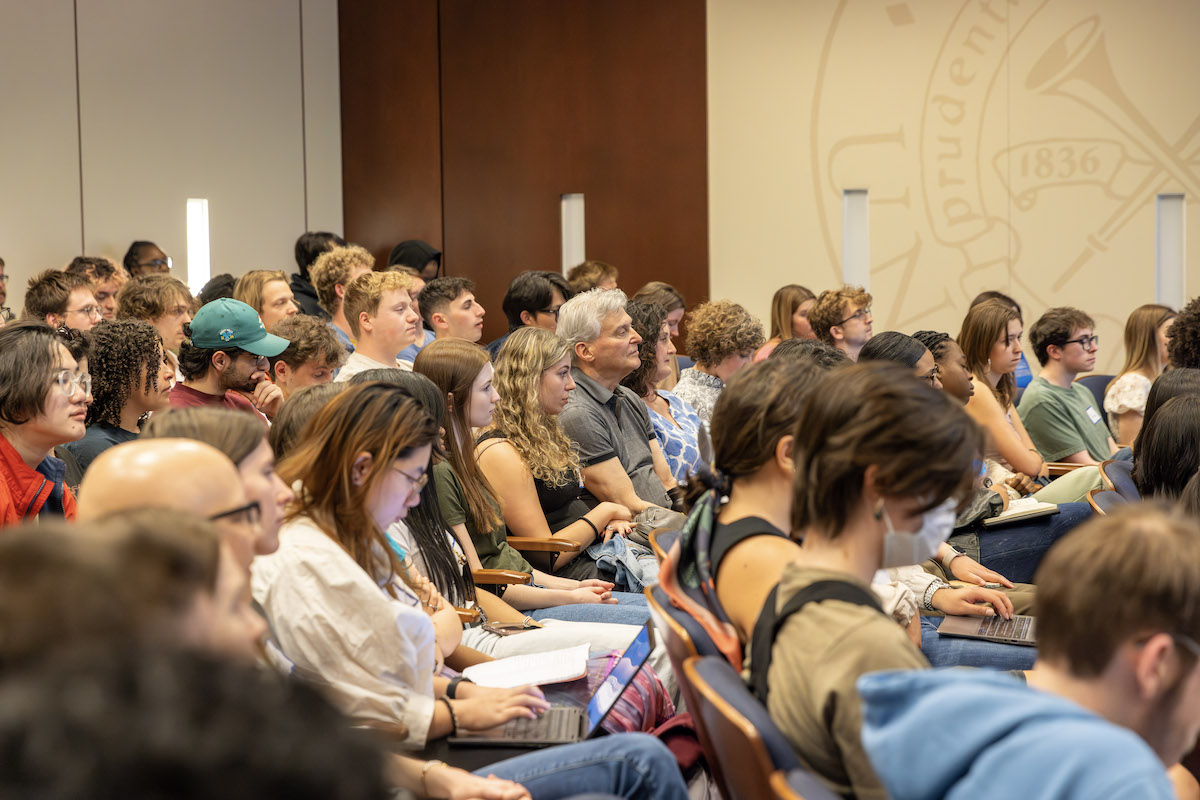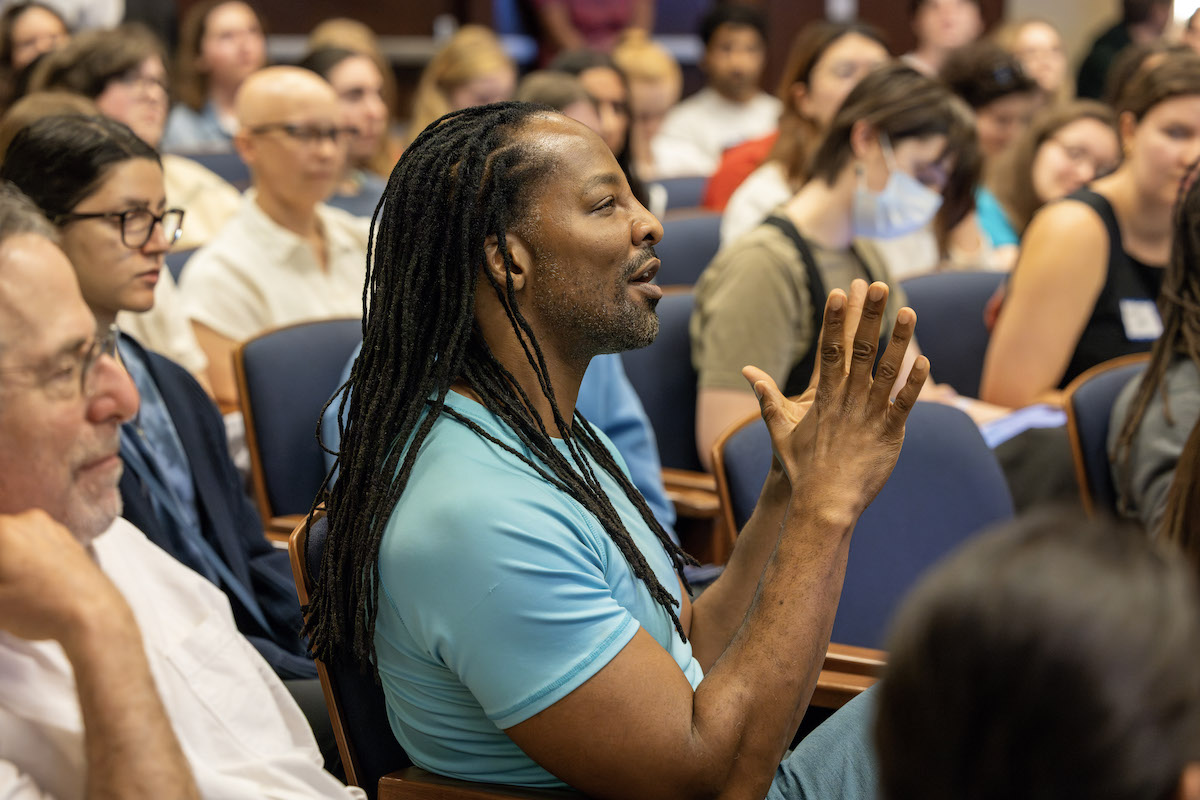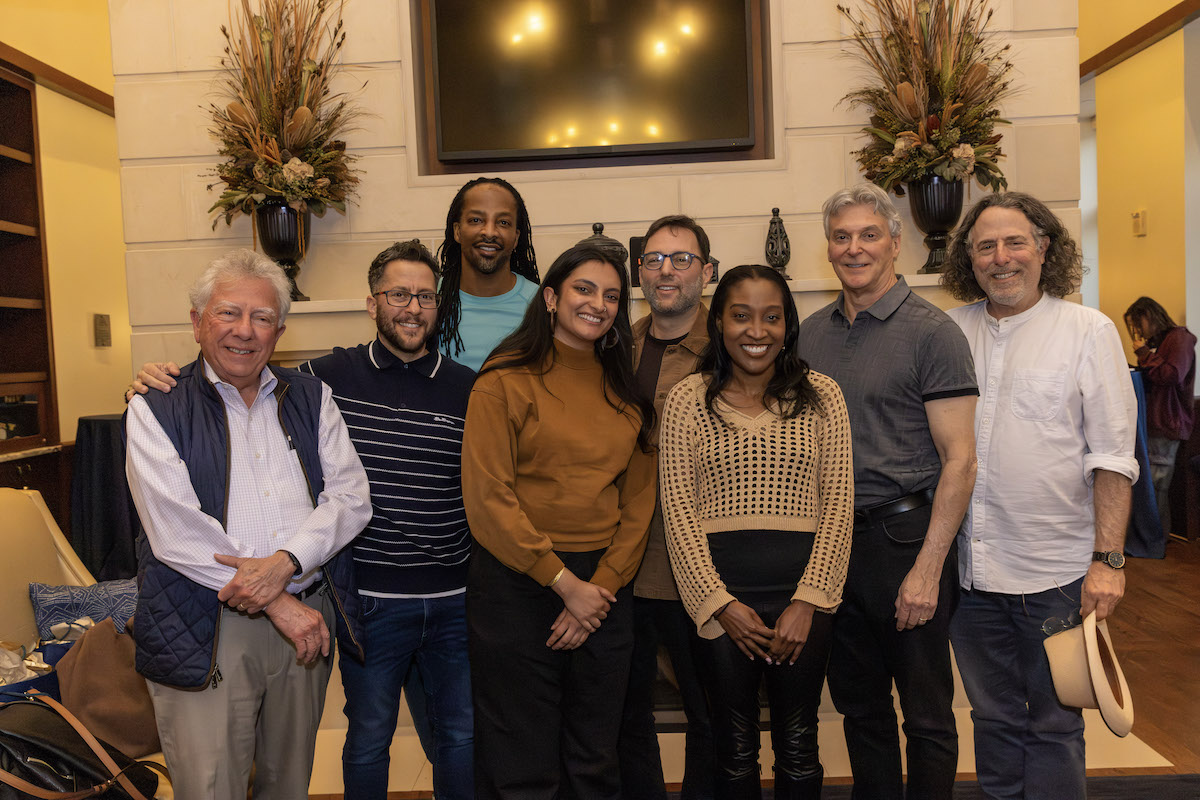On the surface, Paramount’s “Mission: Impossible – Rogue Nation,” Apple TV’s “Sunny,” and Netflix’s “The Umbrella Academy” have nothing in common.
But digging deeper reveals a connection: Emory University.
The Hollywood productions came to life with the contributions of Emory College alumni Gina Atwater, Samah Meghjee and Mark Goffman, notable figures in the film industry with some of the most beloved and interesting movies and television shows behind their names, including “Westworld,” “The West Wing” and Amazon’s witty short, “Therapist Speed Dating.”
During a special Emory College event on March 19, an enthusiastic, standing-room-only audience of students, faculty and staff in the Oxford Road Building listened intently as the trio shared how Emory helped them on the path to success in Tinseltown.
“When I first came to Emory, honestly, I was going to be a critic,” says Atwater, a 2006 Emory College graduate in film studies who added creative writing as an additional major after just a week on campus.
“I decided I would rather tell stories,” says Atwater, who in addition to working on “Mission: Impossible” has been involved in the films “Star Trek Into Darkness” and “Star Wars: The Force Awakens” and was a writer on Max’s “Westworld” TV series. “I didn’t want to spend the rest of my life talking about stories other people did. I have stories of my own.”
A spotlight on Hollywood
A discussion between two of Emory’s most famous storytellers — Pulitzer-Prize winning poet Jericho Brown and prolific author and screenwriter T Cooper — prompted the event.
Brown, the Charles Howard Candler Professor of English and Creative Writing and interim director of the nationally recognized creative writing program, approached Cooper, an assistant professor of English and creative writing, after noticing the extensive number of Emory graduates working in film and television during a trip to Los Angeles.
Brown suggested creating an avenue to spotlight those alumni to encourage students who might not envision those career paths because of the opaqueness of Hollywood.
“He came back so excited and said, ‘T, do you know how many people who graduated from Emory work in film and television?’” says Cooper, who worked as writer and executive producer on “The Blacklist” for five seasons. “And I said, ‘No, I don’t know, but I bet it’s a lot.’”
“He said, ‘Let’s do something about it.’”
The result was the 90-minute discussion, developed by the Creative Writing Program in close partnership with the Department of Film and Media and Professor Matthew Bernstein, with additional support from the departments of theater and English, the Office of Alumni Advancement and Engagement, the Pathways Center and the Hightower Fund.
“Emory College alumni are thriving in Hollywood as screenwriters, showrunners and producers, and we are grateful for their willingness to travel back to campus to share insights with current students,” says Branden Grimmett, Vice Provost for Career and Professional Development and Emory College Associate Dean who leads the Pathways Center. “Our team was thrilled to support this event in collaboration with our faculty and academic departments, which reinforced the importance of giving back and the power of the Emory network.”
The panel covered a broad swath of topics, including pulling back the curtain in the writer’s room on a TV show, the importance of networking and the impact streaming is having on pay for writers.
Goffman, an executive producer of Netflix’s “The Umbrella Academy,” Fox’s “Sleepy Hollow” and NBC’s “The Irrational,” says Emory didn’t offer a film major when he attended the university back in 1990 (there was, however, a film minor offered at the time, he says).
But that didn’t stop the economics and philosophy major from taking film and production classes, courses that would fuel his love of creative writing and ignite the switch toward a different career trajectory. Goffman told the audience he would later write an unsolicited “spec” episode of “The West Wing,” which caught the eye of producers of the Emmy-award-winning show, who later hired him.
“I still got to meet a lot of fantastic students who also were excited about film, theater and creative writing,” the 1990 Emory graduate says of his experience at the university, adding that the school’s top-notch film professors also fed his love for TV and film. “I got to learn enough to realize I had an appetite for it.”
Meghjee calls herself a “baby writer” because of her relatively recent entry into the industry. She graduated from Emory College in 2020 after beginning her education at Oxford College.
Still, she has racked up credits on Apple TV’s “Sunny” and Hulu’s “Good American Family” in addition to several playwriting assignments and “Therapist Speed Dating,” a short film she made for Campus Movie Fest while at Emory that later aired on Amazon Prime.
To be successful in Hollywood, she says, you must not only network but juggle numerous assignments simultaneously and create your own opportunities through believing in the stories you want to tell. That starts, she said, with a solid educational foundation, such as the one she received at Emory.
“Emory is a place where brilliance is fostered,” she says, adding that Cooper’s TV pilot writing class matched what she found in the writer’s room. “To write, you have to know a lot about the world, and I got that here.”
Emory students Victor Mendoza-Galvis and Evan Bazel left Wednesday’s panel discussion with a better understanding of what it takes to make it in Hollywood.
“You have visions of grandeur sometimes and you forget it can be an arduous road,” says Mendoza-Galvis, a fifth-year student from London. “It’s about recognizing that it takes work.”
Bazel agreed. “It was motivating to see that people can make it work. It takes a lot of work. But they made the transition and are happy,” says Bazel, a senior majoring in philosophy and English/creative writing.

